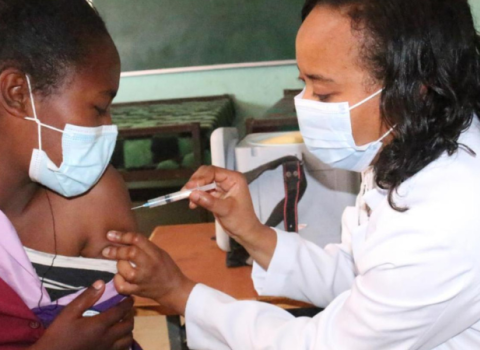
At the beginning of this year, the German crop protection giant Bayer CropScience announced that it had acquired Icon Genetics, a small German company developing methods for producing pharmaceutical compounds in plants. According to the company, the acquisition was a first step towards developing its own line of plant-made pharmaceuticals (PMPs).
Bayer CropScience’s new found enthusiasm for PMPs stands in stark contrast to the situation in the US, where companies like Monsanto have halted their research in this area and many of the pioneering PMP companies have gone bust or are shadows of their former selves.
This means that European companies are now leading the way in this specific biotechnology sector, with Meristem Therapeutics in France and Cobento Biotech in Denmark both conducting clinical trials of their PMPs, while the European Commission and national governments remain keen to fund research in this area. The irony is, according to Yuri Gleba, the founder and CEO of Icon Genetics, that the antipathy in Europe towards plant biotechnology has helped the European PMP sector avoid the pitfalls that have befallen its US counterpart.
Benefits
There are a number of major benefits of using genetically modified plants to manufacture protein-based pharmaceutical compounds, such as hormones, antibodies and immunogenic proteins, compared with conventional methods, which are based on microbial fermentation and animal cell cultures.
Plants are able to produce a much wider range of useful compounds than microbial systems, because the metabolic pathways used by plants are similar to those used by mammalian cells, but plants are not prone to the same risks of pathogenic infection as animal cell cultures. Production of biopharmaceuticals in plants should also be much less expensive and could help overcome the current shortage in production capacity.
The main disadvantage of using plants is the risk that they could spread to contaminate the wider environment. “Plants are a wonderful vehicle for high-quality, consistent production,” says Simon Barber of EuropaBio, the European bioindustry association, “the question is where do you grow them.”
This risk was highlighted in 2003, when it was discovered that transgenic maize developed by US company ProdiGene, one of the pioneers of PMPs, had contaminated two fields of soybeans in Nebraska and Iowa. The US Department of Agriculture fined ProdiGene $250,000 and ordered it to pay for the cost of clearing up and destroying the contaminated soybeans (just under $3 million). This drained the company of funds and in August 2003 it was acquired by Stine Seed, which then spun-off ProdiGene’s R&D activities.
Stine Seed maintains that ProdiGene is still operating as an independent company. ‘I can say that currently much of their efforts are focused on finding a market for some of the promising technologies that have been developed by ProdiGene researchers, as opposed to actual product development,’ says David Thompson, director of marketing at Stine Seed.
Scared off
This single incident had a catastrophic effect on the whole US PMP sector, because it scared off the pharmaceutical firms that were the biggest potential customers for this novel production technology.
According to Gleba, the firms became concerned that producing pharmaceutical compounds in plants would be viewed by regulatory authorities as a ‘double risk’: the risk of a novel pharmaceutical compound combined with the risk of a novel production process. This could make it more difficult to obtain regulatory approval for the drug.
In December 2005, the oldest US PMP company, with the most advanced product pipeline, became the latest victim, when Large Scale Biology Corporation (LSBC) went out of business. ‘Despite our efforts to generate revenue, obtain debt and equity funding, and sell or license selected assets at reasonable prices, our revenue and liquid assets are not sufficient to sustain our current operations,’ said Kevin Ryan, LSBC’s president and CEO.
In Europe, on the other hand, the general distrust of genetically modified (GM) plants had already encouraged companies such as Icon Genetics and Cobento Biotech to grow their pharmaceutical producing plants in contained environments, such as greenhouses, rather than in open fields. This greatly reduces the risk of any of the transgenic plants spreading to the outside world and Europe has not yet suffered a contamination scare.
Meristem Therapeutics, which is probably Europe’s leading PMP company, is an exception, and in 2005 the French government gave approval for it to grow 20 hectares of maize that had been genetically modified to produce the enzyme lipase. However, the destruction of some of this maize by anti-GM campaigners in the summer of 2005 could force it to change its approach.
The European PMP sector also benefits from generous research funding from the European Commission and national governments, which tend to have different priorities to pharmaceutical companies. For instance, in 2004 the European Commission awarded a grant of €12 million to fund a consortium of 39 European research groups for five years, in a project known as Pharma-Planta.
This project is specifically looking at developing plants that can produce vaccines against diseases such as HIV and tuberculosis. ‘Our aim is to work out the [commercialisation] pathway, but then to give the technology and products away on a non-commercial basis to developing countries for humanitarian use, since the products we are developing are targeted at diseases prevalent in these countries,’ says Pharma-Planta member Richard Twyman.
First plant-made vaccine
A number of companies in the US are still conducting research into PMPs, but, as in Europe, many have turned their backs on growing whole plants in open fields. This alternative approach is exemplified by Dow AgroSciences, which in January 2006 obtained regulatory approval in the US for the world’s first plant-made vaccine. Designed to protect chickens against the Newcastle disease virus, this protein-based vaccine is produced by plant cells grown in secure bioreactors.
Bayer CropScience also believes this is the future of plant-based production of pharmaceuticals, according to Bernward Garthoff, the company’s Chief Technology Officer, speaking at BIO 2006 in Chicago, earlier this month.
He told delegates the emergence of new plant cell culture techniques and advances in metabolic engineering, coupled with development in bioreactors was creating “a new business opportunity” to use plant cell cultures for biomanufacturing.
“I believe it can be better than bacterial or mammalian cell culture,” he said. An example is the production of the chemotherapeutic taxol, an extract of tree bark. The problem is that a huge volume of bark is required to produce small amounts of the active substance.
“One solution is continuous production in plant cells, and this is now being pursued,” said Garthoff.





 A unique international forum for public research organisations and companies to connect their external engagement with strategic interests around their R&D system.
A unique international forum for public research organisations and companies to connect their external engagement with strategic interests around their R&D system.